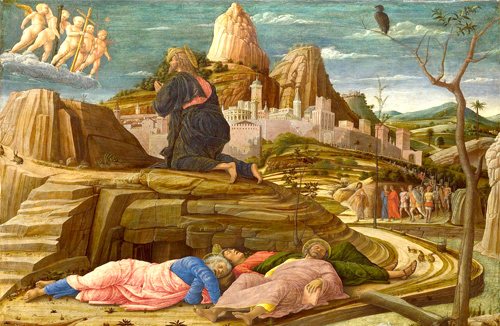
Jesus praying in the Garden of Gethsemane as his disciples slept. By Andrea Mantegna (1431-1506) Photo: Wikipedia
This is the last article in my series on the Hebrew word “paga” — translated intercessor or intercession in the Old Testament. The word is used in many ways and each I believe describe a unique aspect of prayer.
In my earlier article I talked about the intercessor as one who negotiates with God.
In this article, I want to discuss how intercession is a burden that God wants us to carry.
According to the Theological Wordbook of the Old Testament, one of the meanings of the word “paga” is “‘to lay, burden’ (Isa 53:6, ‘the Lord has ‘laid’ upon him all our iniquity’).”
“All we like sheep have gone astray, we have turned every one his own way, and the Lord hath laid (paga) on Him the iniquity of us all.” (King James)
In this verse, God placed the iniquity of the world on the shoulders of Jesus — it was His paga or burden.
In a similar way, a person may be called to carry a burden of prayer for a specific situation or individual.
I remember sometime back my wife telling me of her reluctance to start interceding for a woman in our congregation struggling with cancer. She was concerned of the fight or burden involved, and was not sure she was emotionally ready to join others who were battling on this woman’s behalf.
Though she did take on the burden, it showed me that intercession, properly understood, carries with it a burden and responsibility to see it through to the end.
In Matthew 11: 30, Jesus said, “For My yoke is easy and My burden is light.” Jesus did not promise to eliminate our burdens, He only said they would be light. There is a weight to intercession, but it is one we can carry.
You may conclude from this series that only certain people are called to an intercessory role. This is not true, anyone can intercede. What is true is it requires a greater commitment and discipline in prayer — one that not everyone is prepared to make. This is the burden of intercessory prayer.
In the Garden of Gethsemane, Jesus was alone interceding and praying for strength to finish the task that lay before Him. The prayer was so intense blood drops formed on His face:
“And being in an agony he was praying very fervently; and His sweat became like drops of blood, falling down upon the ground.” (Luke 22:40 NASV)
Jesus had brought the disciples with Him expecting they would join Him in praying through this critical and important time in Jesus’ life. Instead, they fell asleep. Seeing this, Jesus said:
“So you men could not keep watch with me for one hour? Keep watching and praying that you may not enter into temptation: the spirit is willing but the flesh is weak.” (Mat 26:40, 41 NASV)
Read more in this series:

I just went thru something hug! I found your article as I am hungry to learn more and there is so much confirmation here for me ! Thank you Brother for sharing! May God ‘s Blessings be upon you and your household!! Your sister in Christ:)
LikeLike